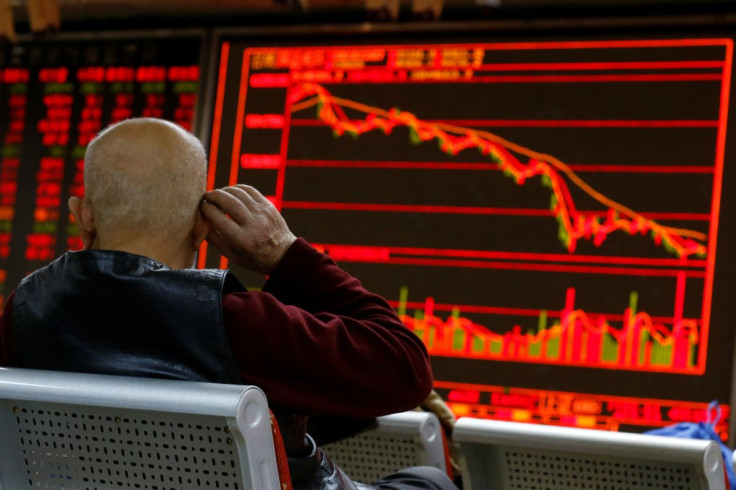Asian Shares Tumble As Global Growth Fears Mount

Asian stocks tracked a steep Wall Street selloff on Thursday, as investors fretted over rising global inflation, China's zero-COVID policy and the Ukraine war, while the safe-haven dollar held most of its strong overnight gains.
MSCI's broadest index of Asia-Pacific shares outside Japan snapped its four-day streak of gains and slumped 2.3%, dragged down by a 1.6% loss for Australia's resource-heavy index, a 3.3% drop in Hong Kong stocks and a 1% retreat for blue chips in mainland China.
Japan's Nikkei also skidded, shedding 2.5%.
Tech giants listed in Hong Kong were hit hard, with the index plummeting 5% on Thursday morning. Tencent shares, in particular, fell more than 7% after it reported flat revenue growth in the first quarter, its worst performance since going public in 2004.
China's technology sector is still reeling from a year-long government crackdown and slowing economic prospects stemming from Beijing's strict zero-COVID policy, even though soothing comments from Vice Premier Liu He to tech executives had buoyed sentiment on Wednesday.
U.S. and European futures fell on Thursday morning. Overnight on Wall Street, earnings reports from retail giants added to concerns that high inflation would slow global growth, with Target Corp warning of a bigger margin hit due to rising fuel and freight costs as it reported its quarterly profit had halved. One day earlier, Walmart Inc warned of similar margin squeezes.
Target's shares plunged 24.88%, the biggest one-day percentage drop since 1987. On Wednesday, the Nasdaq fall almost 5% while the S&P 500 lost 4%.
"The bounce on Tuesday was proven to have been 'too optimistic', thus the self-doubt stemming from the misjudgement only makes traders to click the sell button even harder," said Hebe Chen, market analyst at IG.
"It must be said that the concern for inflation has never gone away since we stepped into 2022, however, while things haven't reached the point of no return, they are seemingly heading in the direction of 'out of control'. That, is probably the most worrying part for the market.
The U.S. dollar, which had rallied on falling risk appetite, paused its gains on Thursday, with the greenback easing 0.05% against a basket of major currencies. The Japanese yen, on the other hand, fell 0.3% against the dollar.
Data showed on Wednesday that British inflation surged to its highest annual rate since 1982 as energy bills soared, while Canadian inflation rose to 6.8% last month, largely driven by rising food and shelter prices.
Poor U.S. housing data also added to slowdown concerns, and Fed Chair Jerome Powell had ratcheted up the hawkish rhetoric the previous day by saying the U.S. monetary authority would push interest rates as high as needed to stem a surge in inflation that he said threatened the foundation of the economy.
Bilal Hafeez, CEO of London-based research firm MacroHive, said there was a strong bias toward safe-haven assets right now, particularly cash.
"There may be short-term bounces in equities like the last few days, but the big picture is that the era of low yields are over, and we are transitioning to a higher rates environment," Hafeez told the Reuters Global Markets Forum. "This will pressure all the markets that benefited from low yields - especially equities."
U.S. Treasuries rallied overnight and were largely steady in Asia, leaving the yield on benchmark 10-year Treasury notes at 2.9076%.
The two-year yield, which rises with traders' expectations of higher Fed fund rates, touched 2.6756% compared with a U.S. close of 2.667%.
Oil prices climbed on Thursday, recovering from early losses, as lingering fears over tight global supplies outweighed fears over slower economic growth.
Brent crude rose 1% to $110.42 per barrel, while U.S. crude was up 0.6% to $110.2 a barrel.
Gold was slightly higher, with spot gold trading at $1816.29 per ounce. [GOL/]
© Copyright Thomson Reuters 2024. All rights reserved.




















